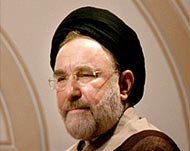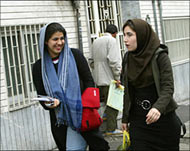Dapper rapper stirs Iran
A smartly dressed singer is winning fans and annoying conservatives in Iran with music far from its roots in US ghettoes.

Shahkar Binesh-Pajouh, Iran’s bow-tie wearing dapper rapper would look somewhat out of place in the Bronx borough of New York.
Targeting unemployment, poverty and Westernised Iranian girls in his new album, Binesh-Pajouh is a lecturer with a doctorate in urban planning whose poetry translations will hit the shelves soon.
“I chose rap because I can say many things with it, not because I live like a rapper,” said Binesh-Pajouh in his affluent north Tehran apartment.
He said it took four years for the Culture Ministry to approve a rap album and it did so only after he deleted six songs from his original 10.
“Iran’s officials were reluctant to give permission to rap music because of its critical language,” he said.
Changing times
Officials imposed a two-year ban on his live acts in 1999 after hard-line vigilantes broke up one of his concerts at a Tehran music festival.
Following Iran’s 1979 Islamic revolution all but classical or religious music was banned. But restrictions eased after the landslide victory of reformist President Muhammad Khatami in the 1997 elections.
 |
|
Restrictions have eased under |
The lyrics in Binesh-Pajouh’s Eskenas album focus on the malaise of poverty. Iran says 17% of the population live in poverty; analysts put the figure nearer 40%.
“No one is born a thief, but you cannot find a loaf of bread at night,” the 32-year old sings. “Have you ever seen your child biting a watermelon skin from hunger in a slum?”
Eskenas is Persian for a banknote and on the album cover Binesh-Pajouh poses like a Chicago gangster, puffing on a fat cigar above a torn one dollar bill.
Among the many maxims drummed into Iranian schoolchildren is: “Anyone who is knowledgeable has power, with knowledge the heart of an old person is young.”
In Binesh-Pajouh’s scathing lyrics this becomes: “Anyone who is wealthy has power, with wealth the heart of an old person is young.”
Challenging opinions
Binesh-Pajouh also pokes at fun at girls who he thinks wear too much make-up. “Lip liner and lipstick are more vital than daily bread,” he raps.
Iranian girls, he says, would be better off if they followed Persian traditions instead of being infatuated with Western fashions.
 |
|
The rapper has criticised Iranian |
Binesh-Pajouh has published two books and his translation of love poetry by Chilean Nobel laureate Pablo Neruda is pending publication.
The rapper said music should serve as a medium to challenge opinions in Iran, a country where more than 70% of its 66 million people is under 30.
“I intend to criticise socio-political problems more seriously in the future,” he said.
The latest Western hits and banned California-based Persian singers are widely available in Iran. Binesh-Pajouh believes bans have only set up pre-revolutionary singers as idols for the young.
In Iran, live concerts are still tepid affairs as concert-goers are banned from dancing. Music critics are also worried.
“We are concerned about the future of music as conservatives become more powerful,” said one who did not want to be named.